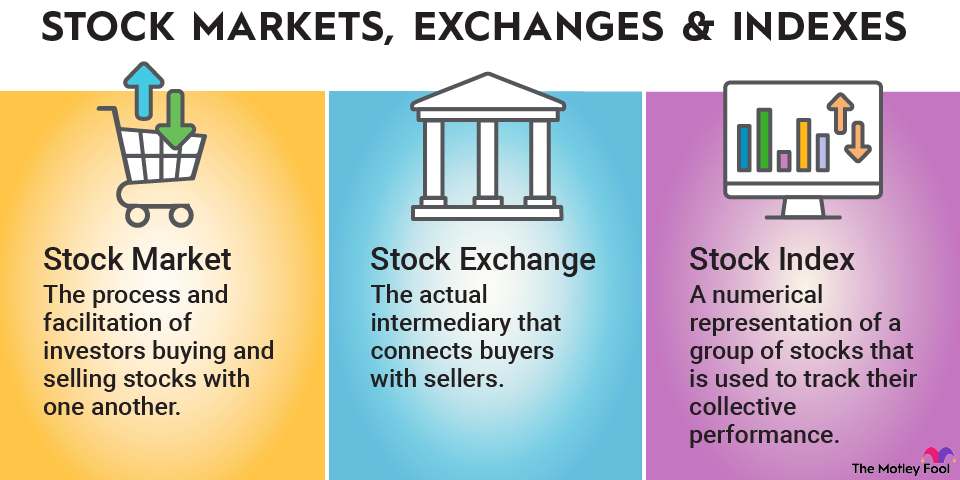There are thousands of publicly traded companies you can invest in, not to mention the many exchange-traded funds (ETFs) and mutual funds you can buy. Therefore, it's unsurprising that many investors are unsure of where to start. Even with a market near an all-time high as we head into 2026, many stocks remain extremely attractive for long-term investors to consider buying.
Publicly Traded Company
But what are the best stocks to buy in December 2025? Although I can't consult a crystal ball that tells me what stocks will deliver the best returns, I've tried to do the next best thing. In this article, I'll discuss 10 stocks that I think could be great buys for long-term investors looking to put their money to work.

Why these 10?
Before we get to the stocks, let's acknowledge three caveats:
- Choosing the best stocks to buy today depends on your personal financial situation. To get a feel for where you stand, read our guide on how to invest in stocks. It walks you through topics such as establishing an emergency fund, allocating assets, and choosing the right stocks for you.
- I like these stocks as long-term investments, even if a market crash or bear market arrives. I have absolutely no idea what they'll do over the next few weeks or months. In fact, if inflation unexpectedly spikes higher, trade tensions escalate, or the U.S. falls into a deep recession, it's entirely possible that most or all of them could soon decline.
- Although I ensured some variety, the list below isn't meant to be a fully diversified portfolio. Instead, these are my highest-conviction long-term stocks to invest in now. The best one-step way to diversify your holdings is to build the core of your portfolio around something like the Vanguard Total World Stock Index Fund ETF (VT +0.47%) or the Vanguard S&P 500 ETF (VOO +0.47%).
Now, let's get to my list of the 10 best stocks to buy and hold for the long term, followed by the summarized buy thesis for each.
| Name and ticker | Current price | Market cap | Industry |
|---|---|---|---|
| PayPal (NASDAQ:PYPL) | $59.44 | $55.6 billion | Diversified Financial Services |
| Airbnb (NASDAQ:ABNB) | $136.49 | $82.8 billion | Hotels, Restaurants and Leisure |
| CrowdStrike (NASDAQ:CRWD) | $478.78 | $120.7 billion | Software |
| MercadoLibre (NASDAQ:MELI) | $1,995.82 | $101.1 billion | Multiline Retail |
| Intuitive Surgical (NASDAQ:ISRG) | $577.34 | $204.7 billion | Healthcare Equipment and Supplies |
| Shopify (NASDAQ:SHOP) | $169.38 | $220.7 billion | IT Services |
| Walt Disney (NYSE:DIS) | $113.22 | $202.1 billion | Entertainment |
| Berkshire Hathaway (NYSE:BRK.B) | $500.51 | $1.1 trillion | Diversified Financial Services |
| Amazon (NASDAQ:AMZN) | $232.16 | $2.5 trillion | Multiline Retail |
| Alphabet (NASDAQ:GOOGL) | $314.35 | $3.8 trillion | Interactive Media and Services |
Pitches for each stock
Now that you've seen my top 10 best stocks to buy now, you may be wondering why I picked each company. Here's a quick rundown of why I'm such a fan of each as a long-term stock to invest in.
1. PayPal

NASDAQ: PYPL
Key Data Points
PayPal is an absolute cash machine that is down by about 80% from its highs. If you aren't familiar with the recent history, PayPal completely overhauled its management team in late 2023. Every member of its C-suite is new to the business, and it is an impressive group.
The new leaders have already made some big moves, including rolling out an industry-leading cash-back debit card product and launching an advertising platform. PayPal recently announced an agreement with OpenAI to become the first digital wallet integrated into ChatGPT. Since the new leadership took over, efficiency has improved dramatically, and earnings per share (EPS) is significantly higher.
This could be just a starting point. Management presented investors with a growth roadmap in early 2025, which showed that the team believes it can achieve sustainable 20% annual earnings growth in the not-too-distant future.
The company has 434 million active users across PayPal and Venmo, and it processes about $1.9 trillion in annualized payment volume. It also generates more than $6 billion in free cash flow annually and has been using it to aggressively repurchase its own stock, a sign that management believes it's undervalued.
It's not hard to see why PayPal's management is choosing to use its capital this way. As of December 2025, the stock traded at a historically low price-to-sales (P/S) ratio of less than 1.8 times trailing-12-month sales and for just 11 times forward earnings.
2. Airbnb

NASDAQ: ABNB
Key Data Points
Few companies have been as successful in disrupting an entire industry as Airbnb. The company began in 2007 with a few air mattresses on the floor of the co-founders' apartments (from which the company derives its name) and has since evolved to become a leader in changing the way millions of people view travel accommodations.
Airbnb has more than 5 million hosts who list over 8 million properties and experiences on its platform. In the most recent quarter alone, more than 133 million nights and experiences were booked on Airbnb's platform, with a total booking value of $22.9 billion, which represents 14% year-over-year growth.
Airbnb is not only massive and growing quickly but also highly profitable. It generated $4.5 billion in free cash flow and had a 38% FCF margin over the four quarters ending Sept. 30, 2025.
Looking forward, Airbnb has $11.7 billion in cash and short-term investments on its balance sheet. And it still has a massive growth opportunity.
Its overall market opportunity is estimated to be trillions of dollars when including short-term stays, long-term stays, and experiences. Additionally, management appears to believe that the stock's valuation doesn't accurately reflect the long-term opportunity, given that the company has been buying back shares at a relatively aggressive pace.
3. MercadoLibre

NASDAQ: MELI
Key Data Points
One of my favorite long-term stock investments in the market, MercadoLibre, is often referred to as the Amazon of Latin America, and for good reason. The company operates an e-commerce marketplace with a dominant presence in some of the region's most populous nations, including Brazil and Argentina.
However, there's a lot more to MercadoLibre. It operates a fast-growing payments platform called Mercado Pago, a logistics service known as Mercado Envios, a business lending platform, and more.
The marketplace saw $16.5 billion in merchandise volume in the third quarter of 2025, representing a 28% increase over the same quarter in 2024. Mercado Pago processes almost $285 billion in annualized payment volume, with three-quarters of this volume coming from outside the company's e-commerce platform.
Both main parts of the business are growing rapidly. And don't overlook Mercado Crédito, the company's young but fast-growing (and highly profitable) lending business. Mercado Crédito has $11 billion in outstanding loan balances.
MercadoLibre isn't just the Amazon of Latin America -- it's the Amazon, PayPal, Block (XYZ -0.32%) (owner of Square and Cash App), Shopify, and more, all rolled into one. And it's in a much earlier stage of growth. As the e-commerce and fintech landscapes in Latin America evolve over the coming years, MercadoLibre could be a major long-term beneficiary.
E-commerce
4. CrowdStrike

NASDAQ: CRWD
Key Data Points
It seems like every week, there's another high-profile security breach. The need for cybersecurity solutions certainly isn't getting any smaller. And that's especially true when it comes to cloud-based security. CrowdStrike is leading the charge to keep data secure in the cloud. This is a best-in-breed cybersecurity company with a highly effective platform.
CrowdStrike collects security data from each of its many users, analyzes it, and uses it to automate security throughout its entire network. This makes the platform highly effective at detecting the newest threats.
And the more users adopt CrowdStrike's solutions (known as its Falcon platform), the more effective it becomes. The use of crowdsourced threat data, combined with its leading market share, gives it a competitive advantage over peers.
With almost $5 billion in annual recurring revenue and an 80% subscription gross margin, CrowdStrike's growth has been impressive, but this could be just the beginning. The company sees its current addressable market at $116 billion in potential revenue and expects that the opportunity could more than double to $250 billion by 2029.
5. Intuitive Surgical

NASDAQ: ISRG
Key Data Points
Robot-assisted surgery beats shaky human hands. That general thesis hasn't changed significantly since I first noticed Intuitive Surgical stock in 2005. The da Vinci Surgical System is the clear market leader, and its "razor and blades" model helps Intuitive generate a recurring stream of revenue.
In the third quarter of 2025, Intuitive Surgical reported year-over-year revenue growth of 23%, fueled by 20% growth in performed da Vinci procedures. Intuitive Surgical is dominant in its space, with a global market share of about 80%.
It has lots of room to grow as the adoption of its surgical systems and the number of supported procedures increase over time. This is particularly true in many international markets, where the implementation of robot-assisted surgery could be a long-tailed growth catalyst for this excellent business for decades to come.
6. Shopify

NASDAQ: SHOP
Key Data Points
Shopify operates a platform designed to enable businesses of all sizes to sell their products online, with a particular focus on empowering smaller businesses and growing with them by establishing long-term relationships. Shopify offers a subscription plan starting at $39 per month for businesses (even less for one-person merchants).
The company also provides many adjacent services that help businesses operate smoothly, such as payment processing solutions and logistics. Shopify's one-stop-shop approach to enabling e-commerce has turned it into a powerhouse. It now has more e-commerce sales flowing through its ecosystem than any company besides Amazon, and Shopify could be just getting started.
The platform has generated nearly $11 billion in revenue over the past four quarters. However, this is just a fraction of its estimated $153 billion (and growing) market opportunity as more retailers shift their focus to online sales.
E-commerce is still in the relatively early stages, making up slightly more than 16% of retail sales in the United States. Shopify's platform has the No. 2 share of e-commerce by total payment volume (second only to Amazon), giving it a powerful ecosystem with network effect advantages over competitors.
7. Walt Disney

NYSE: DIS
Key Data Points
The House of Mouse is like the all-weather tires of a portfolio. The pandemic hurt its theme park and movie businesses but helped the Disney+ streaming service, which has grown into a powerhouse years earlier than Disney expected.
In fact, six years after launching, Disney+ Core now has more than 130 million paid subscribers, while Hulu adds tens of millions more. Additionally, the market is absorbing price increases with minimal impact on subscriber counts, and Disney's streaming business is now profitable.
While consumers are clearly feeling the pressure of inflation, demand for Disney's theme parks, movies, and cruise line has been strong. In fact, per-guest revenue in Disney's parks is far greater than in comparable pre-COVID-19 pandemic times, thanks to initiatives that have driven higher in-park spending. Additionally, the company is investing $60 billion over the span of a decade in its theme parks and cruise line to ensure they remain full for the foreseeable future.
With Disney also laser-focused on the profitability of Disney+ and its other streaming platforms, Hulu and ESPN+, this could be a powerful combination of profitable, all-weather revenue streams. In a nutshell, Disney might be the ultimate combination of an in-person experiential stock and a tech-focused growth business.
Disney's amazing stable of intellectual properties (the Marvel Cinematic Universe, Star Wars, ESPN, Pixar, etc.) and its cash-machine theme park business give it a margin of safety that makes it perhaps the safest stock on this list. And it still maintains tremendous profit growth potential as newer areas of its business evolve.
8. Berkshire Hathaway

NYSE: BRK.A
Key Data Points

NYSE: BRK.B
Key Data Points

NASDAQ: AMZN
Key Data Points
Amazon doesn't really need much of an elevator pitch for most people. The company maintains a dominant market share in the U.S. e-commerce market. And its Amazon Web Services (AWS) cloud platform is also a market leader, with a significant lead over the other two large players in the space, Microsoft and Alphabet.
However, more growth potential exists than you might think. We're still a long way from maximizing e-commerce adoption, as it accounts for only a little more than 16% of all U.S. retail sales.
The cloud industry is relatively young and expected to roughly quadruple in size to a $2.3 trillion market by 2032. Amazon also has a ton of potential in other areas, including healthcare, grocery stores, neighborhood markets, and more.
10. Alphabet

NASDAQ: GOOGL
Key Data Points
Factors influencing top stocks
There isn't just one factor -- or even a defined set of factors -- that make a stock a "top stock" to buy. But there are a few common things to look for:
- A leader in its industry (or close to it)
- A large opportunity for future growth
- A reasonable valuation
- An identifiable competitive advantage
- Stable (and preferably growing) profitability
How to use this stock list
If you're just starting out on your investing journey (or want a sanity check), please read through our guide on how to invest in stocks (mentioned at the top of this article). It goes through all the basics, from getting started to determining your personal investing strategy and how much of your money to invest in stocks.
Although I'm bullish on each of these stocks and think they are good investments to buy right now, they might not all be the best choices for investors without established and diversified portfolios. Even the most stable companies on this list aren't immune to volatility in their stock prices, especially over short periods.
For this reason, if you're just getting started, you'll also want to see our list of the five top tips for investing in stocks for beginners. To be sure, I think the 10 stocks discussed here are some of the best long-term stock investments you can buy now. But it's wise to start with the stocks that speak to you and feel free to ignore the ones that don't.
Benefits and risks of investing in top stocks
Investing in these top stocks has its share of pros and cons. Some of the benefits include:
- High growth potential: These companies all have the potential to grow their revenue and earnings at well above average rates in the coming years.
- Strong return potential: Strong growth rates position these companies to deliver robust stock price gains.
- Capitalizing on key growth megatrends: Many of the companies on this list are leaders in capitalizing on growth megatrends such as cybersecurity, artificial intelligence (AI), e-commerce, financial technology, and cloud computing.
On the other hand, some potential risks to consider include:
- Elevated valuations: Many of these companies trade at higher valuations compared to the market average. That could limit their upside potential if these companies don't grow as fast as investors anticipate.
- Volatility: Many of these companies will be more volatile than the broader market.
Related investing topics
How to buy best-performing stocks
Fortunately, modern-day brokers have made buying stocks like these easy. Just go through these steps:
- Open your brokerage app: Log in to your brokerage account where you handle your investments.
- Search for the stock: Enter the ticker or company name into the search bar to bring up the stock's trading page.
- Decide how many shares to buy: Consider your investment goals and how much of your portfolio you want to allocate to this stock.
- Select order type: Choose between a market order to buy at the current price or a limit order to specify the maximum price you're willing to pay.
- Submit your order: Confirm the details and submit your buy order.
- Review your purchase: Check your portfolio to ensure your order was filled as expected and adjust your investment strategy accordingly.
















